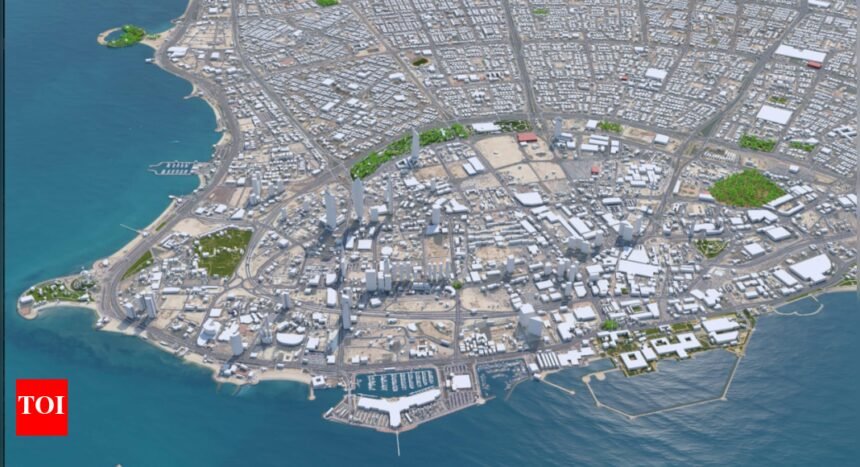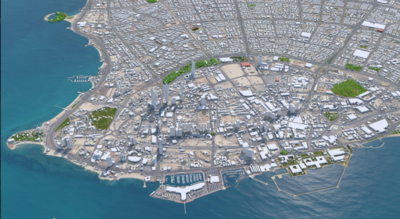TL;DR:
Kuwait is one of the only countries in the world without a single natural lake or river.- The country relies heavily on desalination plants and imports to meet its freshwater needs.
- Despite geographic limitations, Kuwait has built one of the world’s largest per-capita water systems.
Kuwait’s shimmering skyline and bustling urban centres sit on a desert landscape with one defining characteristic: the total absence of natural freshwater bodies. It has no rivers, no lakes, and no perennial streams. In fact, the country holds the rare distinction of being among the very few globally with zero internal renewable freshwater resources. So, how does a modern nation keep its taps running, crops growing, and population hydrated in such an arid setting?
No Rivers, No Problem:
According to the United Nations Food and Agriculture Organization (FAO), Kuwait has no natural freshwater resources such as lakes or rivers. It receives less than 120 mm of rainfall annually, most of which evaporates quickly due to high temperatures. Unlike countries with mountainous terrain or underground aquifers, Kuwait’s flat, arid geology provides little to no groundwater that is fresh enough to be used. Instead, the country leans almost entirely on one of the most expensive and energy-intensive technologies: seawater desalination.
How Desalination Became Kuwait’s Lifeline
Since the 1950s, desalination has been the cornerstone of Kuwait’s water strategy. The first plant began operating in 1953, and over the decades, the infrastructure has expanded dramatically. Today, more than 90% of Kuwait’s drinking water comes from desalinated seawater pumped from the Arabian Gulf and treated in massive coastal facilities. The country now operates multiple desalination plants, including the Shuwaikh, Doha East, and Az-Zour facilities. According to MEED (Middle East Economic Digest), the Az-Zour North complex is one of the largest in the region, producing over 480,000 cubic meters of water per day.
Importing and Rationing: Secondary Strategies
While desalination remains the primary method, Kuwait supplements its needs through water imports and recycling wastewater for industrial and agricultural use. In recent years, the government has also introduced smart metering and public awareness campaigns to reduce waste and promote conservation. Additionally, the Ministry of Electricity and Water has encouraged the use of greywater systems in commercial buildings and new residential developments.
A Global Outlier
In a 2023 World Bank report on water security in the Middle East and North Africa, Kuwait was singled out as having zero cubic kilometers of internal renewable water resources per year, making it one of the most water-stressed countries in the world by geography. Even countries like the UAE and Bahrain, which also rely heavily on desalination, have some groundwater reserves or seasonal wadis. Kuwait, on the other hand, depends nearly 100% on human-made systems to provide every drop of fresh water.
Resilience Through Infrastructure
Despite these extreme limitations, Kuwait maintains one of the highest per-capita water consumption rates in the world, a testament to its advanced water infrastructure. The country continues to invest in sustainable technologies, including solar-powered desalination, advanced reverse osmosis systems, and wastewater reuse for agriculture and industry. These innovations are not just about survival—they reflect Kuwait’s broader ambition to align with global environmental standards and reduce its long-term dependence on fossil fuels for water production. However, experts caution that the country’s water supply remains vulnerable to rising energy costs, geopolitical risks, and climate change impacts. Because desalination is energy-intensive, any disruption in fuel supply or power infrastructure could have a ripple effect on water availability. To tackle this, the Kuwaiti government is actively exploring public-private partnerships (PPPs) to expand capacity and ensure a resilient supply chain that can withstand future shocks.
Verdict
Kuwait’s lack of rivers or lakes might seem like an impossible obstacle, but the country has turned its geographical disadvantage into an engineering triumph. By mastering desalination and modern water management, it has built a system that not only supports everyday life but also allows for industrial growth and urban expansion in an unforgiving climate. Yet, this achievement comes with a price, financial, environmental, and strategic. Water in Kuwait is not just a natural resource; it is a manufactured necessity, one that requires constant innovation, investment, and public awareness. As the global climate crisis deepens and freshwater scarcity becomes a shared global concern, Kuwait’s experience may serve as both a cautionary tale and a blueprint, reminding the world that water security is no longer a passive gift of geography, but a challenge to be engineered and sustained.







